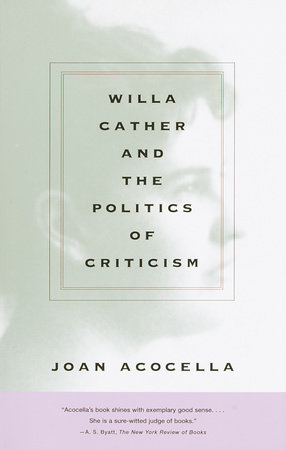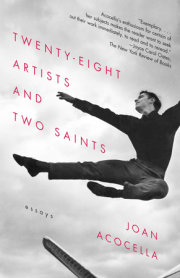Joan Acocella’s acute and often very funny critique of the critics untangles Cather’s reputation from decades of politically motivated misreadings, and proposes her own view of Cather’s genius. Serving also as a concise and graceful summary of Cather’s life and work, Willa Cather and the Politics of Criticism is a refreshing plea that books be read for themselves, and will inspire readers to return to one of America’s literary stars.
"Does criticism owe any fidelity to the manifest values of great authors? No one has posed that question more instructively than Joan Acocella. This shrewd, wry, and pithy book—at once a critical case history and a manifesto—should be read not only by everyone who admires Cather but also by literary academics who suspect, with good reason, that their profession has taken leave of its senses"—Frederick Crews, editor of Unauthorized Freud: Doubters Confront a Legend
"What this book manages is a comprehensive view of the trends, fads, fashions, and needs that shape the perception of Cather and her work. The critics are treated as products of their time, rather than the writer. This approach is desirable and delightful in the extreme. It is a reminder to readers and scholars that if the truths of literature are mutable, so are the abilities of academics to find or focus on them"—Merrill Skaggs, author of After the World Broke in Two: The Later Novels of Willa Cather
"What is most astonishing is that Joan Acocella, our nation's premier dance critic, should also be one of our sharpest literary critics. Here, in a vastly expanded version of her refreshing, astute New Yorker article, she defends Willa Cather from the willful misreadings of academic scholarship. Final score: all points to Acocella and Cather"—Wendy Lesser, author of The Amateur: An Independent Life in Letters
"Every critic of American modernism should read this book . . . . As a study of the politics of literary reputation, it is exceptional; as a serene appreciation of a great writer's life and work, it is poetic; as a reminder to critics of the function of criticism, it is harrowing. This book needs to be read."—Robert Thacker, American Literature
"[S]hines with exemplary good sense. Acocella is a sure-witted judge of books . . . Her case is well argued and illustrated . . . [she] is judicious. She is funny . . .When I read Willa Cather and the Politics of Criticism I realized I had gloomily expected that it was virtually impossible these days to write, or to publish, so sensible a book."—A. S. Byatt, The New York Review of Books.
"A cogently argued, persuasive, and often very funny overview of the work of Willa Cather and the congeries of literary critics that have followed in her wake. Acocella . . . is a reasonable, rational critic . . . she is gently polemical and illuminating when she writes of Cather's meticulously crafted prose, and amusingly combative when she writes of certain of the bizarre uses which have been made of that prose in the name of political agendas . . . " —Joyce Carol Oates, The Times Literary Supplement
"This devastatingly concise book isn't going to win its fearless author any prizes--she marches through the ranks of Cather scholars the way Sherman marched through Georgia--but anyone who has had it up to here with political correctness should buy a copy of Willa Cather and the Politics of Criticism and get ready to cheer, long and loudly."—Terry Teachout, National Review
"One of our greatest writers, Willa Cather, has almost been spoiled for us by insensitive teaching, narrow-minded scholarship, indifference to art. Joan Acocella's landmark essay should change all this. It rises to the challenge of reading Cather's work, offering us a triple treat: one of the best guides I know to Cather's complex career and personality; a chilling and convincing case study in the follies of contemporary criticism; and, best of all, an eloquent, subtle defense of the wholeness of the of the artistic imagination."—Morris Dickstein, author of The Gates of Eden
"This slender volume is rich in content on a subject that should not even exist, and yet it does . . . Willa Cather should of course be read as Willa Cather, but Acocella skillfully argues that this is far from the reality . . . Excellent at exposing the absurd . . . A splendid study, this book goes beyond Cather to literary criticism in general."—Choice
"Generally we ask that literary criticism be insightful, that it leave us with a new understanding or appreciation of a writer we admire. Rarely does it have the power to move us as the best fiction does. But that is what Acocella achieves in the final chapters of her book, and especially in chapter eight, entitled "The Tragic Sense of Life." . . . . In a skillful weaving of quotations and insights, Acocella creates literary criticism that lives, that exists as the very extension of the work it considers--which is to say criticism of the highest order."—Partisan Review
"Acocella wittily charts decades of politically influenced Cather criticism and suggests an approach that balances politics with 'a sustained attention to what the artist is saying.' Acocella is pointed and funny in her analysis . . . and compelling in her request to move beyond politics"—Publisher's Weekly (starred review)
"A first-class book, a landmark of sorts . . . . Cather emerges as what she really is, a person of great literary accomplishment, a true cultural beacon."—RWB Lewis




